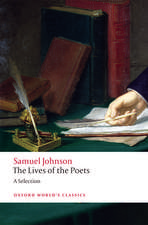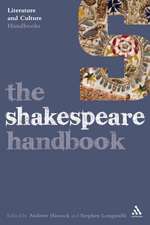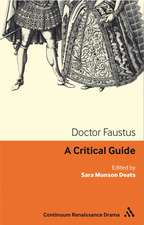Anonymity in Early Modern England: 'What's In A Name?'
Autor Barbara Howard Traister Editat de Janet Wright Starneren Limba Engleză Paperback – 16 noi 2016
| Toate formatele și edițiile | Preț | Express |
|---|---|---|
| Paperback (1) | 469.34 lei 6-8 săpt. | |
| Taylor & Francis – 16 noi 2016 | 469.34 lei 6-8 săpt. | |
| Hardback (1) | 1056.28 lei 6-8 săpt. | |
| Taylor & Francis – 28 feb 2011 | 1056.28 lei 6-8 săpt. |
Preț: 469.34 lei
Nou
Puncte Express: 704
Preț estimativ în valută:
89.82€ • 92.79$ • 74.75£
89.82€ • 92.79$ • 74.75£
Carte tipărită la comandă
Livrare economică 25 martie-08 aprilie
Preluare comenzi: 021 569.72.76
Specificații
ISBN-13: 9781138275454
ISBN-10: 113827545X
Pagini: 198
Dimensiuni: 156 x 234 mm
Greutate: 0.45 kg
Ediția:1
Editura: Taylor & Francis
Colecția Routledge
Locul publicării:Oxford, United Kingdom
ISBN-10: 113827545X
Pagini: 198
Dimensiuni: 156 x 234 mm
Greutate: 0.45 kg
Ediția:1
Editura: Taylor & Francis
Colecția Routledge
Locul publicării:Oxford, United Kingdom
Notă biografică
Janet Wright Starner is associate professor of English at Wilkes University, USA Barbara Howard Traister is professor of English at Lehigh University, USA
Recenzii
'It is true that anonymous works receive less attention than those works that can be attributed to a canonical author, and this collection succeeds in suggesting ways in which carefully selected anonymous works may be usefully approached thematically and historically, and as specific genres.' Renaissance Quarterly 'Anonymity in Early Modern England makes an important contribution to early modern studies, precisely because it addresses what many scholars have traditionally avoided. Anonymity is not an unfortunate condition for a book, pamphlet, or manuscript, nor is it merely a pragmatic device by which the author wishes to avoid arrest. The book argues persuasively that anonymity is an essential, if paradoxical, aspect of self-fashioning. Anonymity is a form of authorship in its own right.' Sixteenth Century Journal
Cuprins
Introduction; Part 1 Anonymous Manuscript Poetry; Chapter 1 Anonymity in Early Modern Manuscript Culture, Marcy L.North; Chapter 2 “Jacke on Both Sides”, Janet WrightStarner; Part 2 Anonymous Printed Plays and Pamphlets; Chapter 3 What Wrote Woodstock, ThomasCartelli; Chapter 4 Dealing with Dramatic Anonymity, Barbara HowardTraister; Chapter 5 Attributing Authorship and Swetnam the Woman-Hater, JamesPurkis; Chapter 6 Was Anonymous a Jokester?, Susan GusheeO’Malley; Part 3 The Consequences of Anonymity and Attribution; Chapter 7 The Anonymous Shakespeare, BruceDanner; Chapter 8 The Ethics of Anonymity, MarkRobson;
Descriere
Expanding the scholarly conversation about Renaissance anonymity and attribution studies, this collection explores the phenomenon of anonymous publication in all its variety of methods and genres. The volume opens with essays investigating particular English texts and the inflection each genre gives to the issue of nameless authoring. Later chapters consider more abstract consequences of anonymity, including its function in destabilizing scholarly assumptions about authorship; its ethical ramifications; and its relationship to attribution studies.




















